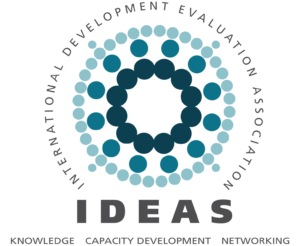Concept
The IDEAS Conference 2022 “Power of evaluation: Influencing decision making for a better and more equal world” will be hosted in Bonn by our partner, the German Institute for Development Evaluation (DEval). Please see the Conference Concept Note.
Introduction
The Mission of IDEAS is to improve and extend the practice of development evaluation, refining knowledge, strengthening capacity building and expanding networks and partnerships for development evaluation. Biennially, IDEAS holds a Conference as a platform bring to bring together diverse evaluation stakeholders to share experiences.
The International Development Evaluation Association (IDEAS) was created in 2002 to meet needs for a global professional association for international development evaluators from diverse sectors and countries. The Mission of IDEAS is to improve and extend the practice of development evaluation, refining knowledge, strengthening capacity building and expanding networks and partnerships for development evaluation. Biennially, IDEAS holds a conference and global assemblies as a platform to bring together evaluators to share experiences. Previous conferences and global assemblies were hosted in Prague (2019), Guanajuato (2017), Bangkok (2015), Bridgetown (2013), Amman (2011), Johannesburg (2009), New Delhi (2005) and Beijing (2002).
This year, the IDEAS Conference will be hosted in Bonn by our partner, the German Institute for Development Evaluation (DEval). DEval was established in 2012 to provide governmental and non-governmental development cooperation organisations with independent and scientifically sound evaluations, which they can feed into their strategies, instruments and programmes.
Background
There is no doubt that even in these uncertain times, evaluation has the power to engage with stakeholders, question what is working and what is not in which circumstances, prioritize context, embrace complexity and reinforce human rights for an equal, fair and just world.
As the world slowly and unevenly recovers from the COVID-19 pandemic, new disruptive developments have emerged with undeniably global political, social and economic consequences. The ongoing geo-political conflicts in different parts of the world have led to an unprecedented number of refugee populations. At the same time, existing challenges related to inequities in wealth, COVID related poverty, the climate crisis, exclusion of the vulnerable from access to resources and opportunities as well as the overall gender and equity divide have resulted in a complex scenario for relevant, innovative, and influential evaluation.
In this new world context, the evaluation field must respond with renovated vision to the unprecedented, multiple and inter-related complex situations. The question for evaluation and evaluators worldwide is, should evaluation continue to respond as business as usual or should it be time to seize these crises and take the opportunity to critique its craft and transform its practice. There is no doubt that even in these uncertain times, evaluation has the power to engage with stakeholders, question what is working and what is not in which circumstances, prioritize context, embrace complexity and reinforce human rights for an equal, fair and just world. To do so, the evaluation function has the responsibility, more urgent than ever before, to promote not just robust evidence gathering but also decision-making specifically anchored in the universal values of equity and social justice. Evaluators in turn must have competencies to be change agents, to address structural inequities, facilitate participatory processes that are inclusive, giving voice to those left behind and promote methods and tools that capture diverse perspectives and ways of knowing. As evaluators, we ask the difficult question, “Has and can evaluation have the power to contribute to, reverse or to mitigate the negative effects of such complex scenarios and environment?”
Aim & Objective
The IDEAS Conference 2022 will provide a platform to explore how evaluation can contribute to transformational change, one that recognizes the rights, aspirations of all people, ensures their voices are heard and questions the differential impact on those who are privileged and those who are not.
This year’s Conference with the theme: Power of evaluation: Influencing decision making for a better and more equal world intends to bring together key actors including thought evaluation leaders, evaluation practitioners, government and parliament representatives, academia, evaluation commissioners, Voluntary Organizations for Professional Evaluation (VOPEs), international organizations, senior and young evaluators from the global world to discuss how evaluation can contribute to better and more just decision-making processes in an increasingly dynamic, complex and unequal world.
The Conference will provide a platform to explore how evaluation can contribute to transformational change, one that recognizes the rights, aspirations of all people, ensures their voices are heard and questions the differential impact on those who are privileged and those who are not.
Our Approach
- Keynote speakers on topical issues
- Round tables
- Panel discussions centered on the conference theme and streams
- Exhibitions of publications and evaluation innovations
- Evaluation for Transformational Change Award and recognition of outstanding evaluations
Until the deadline for submission of abstracts, we received almost 60 proposals for diverse interactive session. The IDEAS Programming Committee is assessing the proposals now.
Conference Themes
- Power of evaluation for a better and more equal world
- Partnerships for sustainable development
- The future of evaluation: A perspective from Young and Emerging Evaluators (YEE)
- Evaluation within national ecosystems
- Gender and equity responsive evaluation for better evidence and policies
Participants/Target Audience
The conference participants will be drawn from a diverse range of stakeholders working across the globe. They include:
- Evaluation professionals
- Young and Emerging Evaluators
- Civil society, especially VOPEs
- Policymakers and decision makers
- National and international evaluation organizations
- Parliament representatives
- Private sector organizations
- Media
We look forward to exchanging ideas and experiences with you!
- Ada Ocampo, IDEAS President
- Serge-Eric Yakeu Djiam, IDEAS Vice-President
- Daniel Svoboda, Coordinator and Head of Administration of IDEAS




